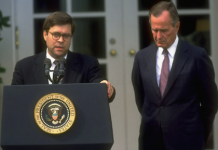
On Dec. 7, Trump announced his nomination of William Barr to be the next attorney general. Barr, who served as President H.W. Bush’s attorney general from 1991 to 1993, would – if confirmed by the U.S. Senate – oversee the Mueller investigation.
MARGE BAKER: Sessions, as attorney general, did just about everything wrong. I mean, it was sort of an all-out assault on civil rights, on efforts that are sort of pulling back on reforms to prevent the militarization of local police departments and rolling back attempts to curb police abuses and litigating against the rights of LGBTQ people and supporting draconian immigration policies and supporting voter suppression. I mean. You can go on and on and on. He had a horrendous, horrendous record.
The one thing he did right is recuse himself from overseeing the Mueller investigation and that’s what led to his being fired. And the president, as we know, has put in his acting so-called Attorney General Matt Whitaker, who had been Sessions’ chief of staff, with actually no background that would support his being in this position. It was a way to get rid of Sessions. And now, of course, he’s nominated William Barr. About him, we have some really serious concerns both around rule of law issues and also around his civil rights record.
BETWEEN THE LINES: Summarize some of those concerns, if you would, about William Barr. Is he poised to win confirmation in the Senate given the Republican majority there now?
MARGE BAKER: Well, first of all, from the rule of law side, I mean, remember, we start with Trump wanting someone who will be a loyalist. He went after Sessions, because Sessions wasn’t a loyalist. He put Whitaker in because Whitaker was a loyalist. He said he wants his Roy Cohn, who was the top aide to Joseph McCarthy and during the 1970s, was Trump’s personal lawyer fixer who got things done. That’s what he wants. He wants somebody totally loyal to him and remember that the attorney general position is not the president’s lawyer. The attorney general position is the people’s lawyer. He’s a lawyer for all of the people of the United States, not for the president.
But nonetheless, that’s who Trump wants in this position. And, Barr has – in addition to you had mentioned his role during “Bush One” in pardoning several figures involved in the Iran Contra affair – and those pardons directly undermined the special counsel who was charged with investigating their wrongdoing in Iran Contra.
(Lawrence) Walsh, who was the special counsel – in his biography, says that he was apparently so concerned about Barr’s hostility to the investigation that he was conducting of Iran Contra – that he was rushed to complete a final report for fear of that Barr would shut down the investigation. So real concerns about Barr’s complicity on pardons. But he also has a very expansive view of presidential power. He subscribes to the so-called the unitary executive theory and believes that essentially the president needs to do everything he can to push back, not just against congressional incursions, but that, for example, he’s unlikely to believe that a sitting president could obstruct justice. And so there’s real, real concerns about his subscribing to that executive theory that essentially holds the president above the law.
He’s also been critical of the Mueller investigation. He defended Trump’s decision to fire Comey. He had at least one conversation about becoming Trump’s defense attorney, so taking on a position that Rudy Giuliani now has. And he at one time said there was more basis to investigate this totally scurrilous and debunked theory about a Uranium One conspiracy involving Hillary Clinton. More basis to investigate that than Russian interference in our elections.
So on rule of law, issues on whether this is somebody who’s going to stand up to the president, to be the people’s lawyer, not the president’s lawyer, and really make sure that there’s no interference with the Mueller investigation, we should be seriously concerned. We should be seriously worried.
BETWEEN THE LINES: Marge Baker, what do we know about William Barr’s track record when it comes to criminal justice reform; holding police departments accountable for violence they commit and abuses against the civilian population they’re supposed to protect; civil rights protections; voting rights suppression; immigration enforcement – all very hot topics under the Trump administration?
MARGE BAKER: Barr’s civil rights record is truly concerning and I should say especially where you have concerns about whether the rule of law is being protected. The one area where you’d want to make sure that the laws are enforced and enforced fairly is in the civil rights arena. And his record is concerning there. On criminal justice, he has a very draconian approach to law enforcement. Back in the Bush era, he fostered a system of mass incarceration that disproportionately harmed communities of color. And in ’92, he endorsed the Justice Department report that was about the case for more incarceration. And more recently, he’s been a vocal supporter of harsh mandatory minimum sentences. So in criminal justice, there’s a very concerning record. A concerning record on LGBTQ equality, back in the mid-1990s, he wrote a Law Review article arguing for a return to “traditional morality” based on “natural law.”
On immigrant rights, he supported Trump’s Muslim ban, the first ban, the one that all the courts overruled. He supported that ban. He’s got a very concerning record on a whole set of civil rights issues and I expect more to be exposed during the course of those investigations and during the preparation for the hearings that will happen in January.




